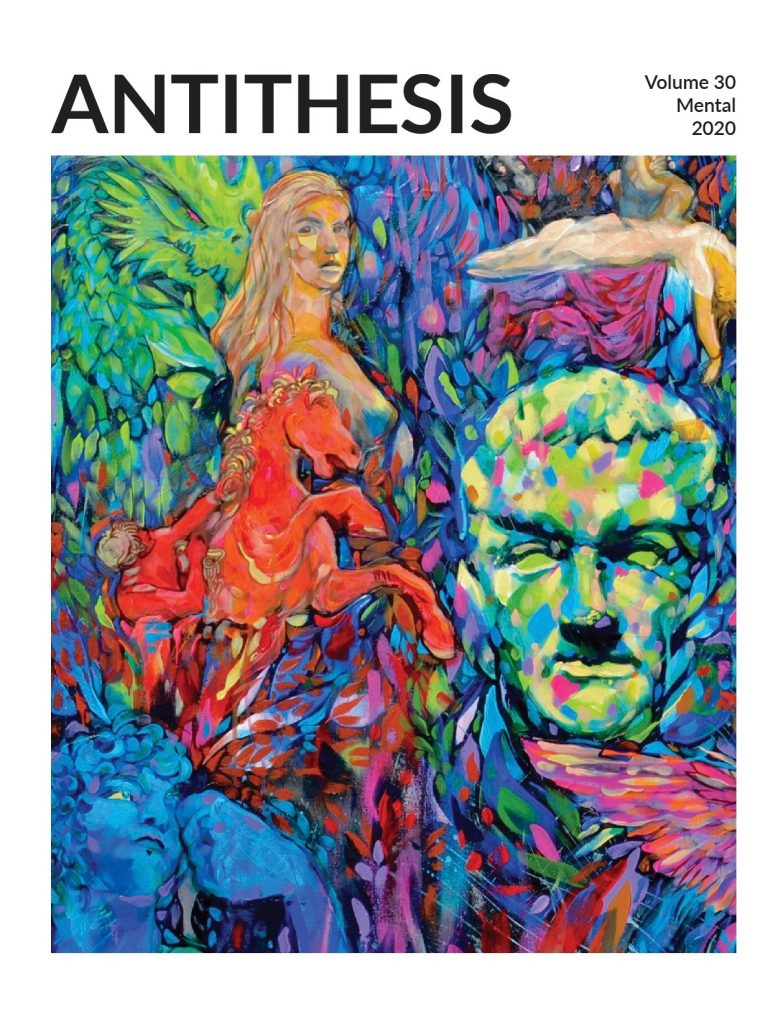
We had a place, a designated café that we always used for interviews. Decent coffee, if not overpriced, with a trendy postgrad hangout vibe. It was February 2020, and my third year as an editor for Antithesis, the postgraduate arts and humanities journal for the University of Melbourne.
After working my way up, I had landed the top job as Editor-In-Chief and my brain was as bursting with ideas as it was with the practicalities of production. I excitedly collected names of creatives I wanted to commission, fantasising about layouts and the diversity of voices I wanted to capture while also screeching at myself about the things that must be done; advertising, grant applications, printing quotes. At the beginning of the year, I had interviews to do, about twenty of them, and I wanted my café and coffee. But already, there was a definitive tension in the city. Cafes – shock horror – were closing, and there was buzz about a lockdown, not that I was sure what that meant.
My lead creative editor and I met our editorial candidates at a nearby library, all of whom were excited, passionate, over-qualified as always, and ready to get to work. As a new team, we created a journal that exceeded even my own very high expectations. Together, we meticulously commissioned and edited a huge array of voices speaking to the lived experience of mental ill-health, disability and adversity. Topics ranged from testifying to the Royal Commission Into Victoria’s Mental Health System to overcoming warfare-induced PTSD. I was immensely proud to have spearheaded a publication so immensely and unforeseeably relevant to the times. Yet never did I see my team in person again.
The next time I would see my lead editor would be, ironically, in a café in Thornbury eight months later. With a box of our completed journals sitting on the table, I walked over to her as she entered.
With equal parts joy and sheer exasperation, she asked me, ‘How are you?’
I never did answer that question. All I could say was ‘Can I give you a hug?’
And we just stood there embraced. For a good few minutes.
Without words, we thanked each other. We acknowledged the phenomenal teamwork and dedication it required to bring our journal to print, against all odds, in the worst global health crisis of the modern age.
The production of Antithesis: Mental, like all of the publishing industry, was forced to adapt in 2020. Our journal might as well have been sponsored by Zoom and Facebook Messenger. The work got done, and it got done well, yet invariably missing was the in-person contact so critical to facilitating a sense of camaraderie and rich, in-depth discussion of submissions. Also removed was the opportunity to meet with our writers to discuss their work in addition to in-person promotional events. The art of schmoozing was rudely disrupted, along with access to the opportunities that may follow.
My team worked throughout all of the uncertainties that COVID-19 threw into their personal lives, from employment instability, financial insecurity and the demands of home-schooling children. Simultaneously, I oversaw production whilst continuously re-shaping my approach and the how of publishing, navigating curveballs and questions that I could never have foreseen;
Will writers still be able to work on their pieces in this time?
Will my team be able to keep going?
Will our printer stay open? What if it doesn’t?
How are we going to launch? In-person? Online?
What about sales strategy? With an online launch, we won’t have a sales table.
The challenges were continuous, all-encompassing and pervasive, demanding constant openness to change. Yet never did our team lose sight of the importance and relevance of our material; a curation of resilient voices in the face of adversity. And it was this critical relevance to the ever-evolving struggles so raw and universally present that saw us through to publication.
COVID-19 has critically impacted the publishing industry on a global scale, from conglomerate publishers right down to graduate student-run journals. The virus has facilitated an increasing shift to digital publications, enforced socially distanced working arrangements and hindered the scope of both marketing and networking opportunities. Student publication committees hold their breath as they await grant application outcomes, their viability entirely reliant on what tertiary institutions can feasibly offer.
Yet research suggests that demand has not decreased. Readers are still reading, whether for the love of it, as distraction from the world or as a lockdown time-filler. While some may escape into fantasy novels and others into romance fiction, where dinner dates are possible and COVID doesn’t exist, others pick up a text in the hope of finding a voice that speaks to their own pain and struggle. The written voice is not bound by COVID, and in this era of lockdowns, words remain a source of comfort and insight when we can’t bear witness to them personally. And the fact the world still wants them, and perhaps sometimes clings, is enough for this editor to fight another day, no matter what it brings.
Antithesis is the graduate student-run arts and humanities journal for the University of Melbourne, publishing fiction, creative non-fiction, poetry, artwork and scholarly articles in an annual print edition, in alignment with a theme. Antithesis: Mental is on sale now.
Sophie Raphael is a writer, editor and mental health peer support worker based in Naarm. She is passionate about mental health writing from both the lived experience and scientific perspectives and is a strict non-fiction fanatic. A current intern at Busybird Publishing, Sophie has also volunteered with Meanjin and Overland, and was the 2020 Editor-In-Chief at Antithesis Journal.
Sophie Raphael
Publishing Intern
